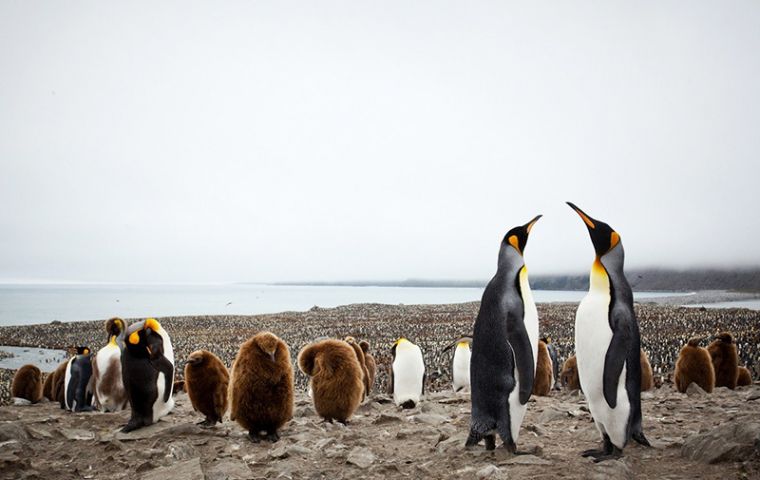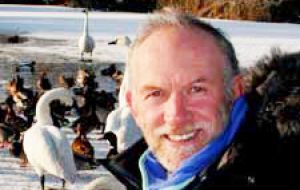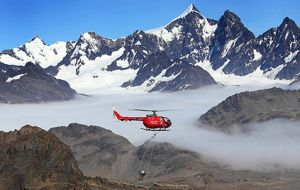MercoPress. South Atlantic News Agency
Funds for South Georgia habitat restoration program; third phase begins February
 The SGHT Habitat Restoration Project was started in 2011 and will cost around £7.5 million in total.
The SGHT Habitat Restoration Project was started in 2011 and will cost around £7.5 million in total.  South Georgia is home to a great wealth of wildlife that exploits the hugely productive seas explained Professor Tony Martin head of the project
South Georgia is home to a great wealth of wildlife that exploits the hugely productive seas explained Professor Tony Martin head of the project  The team basically bait-distributing helicopters back and forth across different areas of the island baiting areas of hundreds square kilometers.
The team basically bait-distributing helicopters back and forth across different areas of the island baiting areas of hundreds square kilometers. The South Georgia Heritage Trust (SGHT) has been awarded a quarter of a million pounds towards the final phase of the Habitat Restoration, or rodent eradication Project, reports South Georgia's Newsletter. The third phase of the several years program is scheduled to begin in February.
The money is coming from the UK Government’s Darwin Plus Fund which is the Overseas Territories Environment and Climate Fund. The grant will contribute towards personnel, travel, accommodation and operating costs of final phase of the project and for assessing the recovery of the South Georgia pipit. Project partners for the awarded funds are GSGSSI and the RSPB.
The SGHT Habitat Restoration Project was started in 2011 and will cost around £7.5 million in total. The £249,783 awarded to SGHT was the second largest award made by the Darwin Plus Fund out of £1.5 million of awards announced for a range of projects in the Overseas Territories.
Meanwhile last Saturday a team left from the Falkland Islands for the final leg of the mission to eradicate rats from South Georgia. The ship, loaded with three helicopters and almost 100 tons of poisoned rat bait will be involved in the last of three bait-spreading stages, which is scheduled to begin February 15.
Project leader Professor Tony Martin from the University of Dundee described South Georgia as a “magical piece of UK territory”.
“It's home to a great wealth of wildlife that exploits the hugely productive seas,” he explained. “But man came along some 200 years ago and messed it up by bringing rats and mice.”
King penguins are too large to be attacked by rats, but many seabirds have suffered badly since the invasion. Species including the wandering albatross, which has the largest wing span of any bird, have their ground nests raided.
Prof Martin said that the diminutive Wilson's storm petrel had been almost totally wiped out. “These birds only live on off-shore islands that are acting as lifeboats,” he said. “Many seabirds have no defense against marauding rats that eat their chicks and eggs.”
However the vast glaciers that segment South Georgia's landscape, which the rats cannot cross, have allowed the team to carry out a three-phase extermination project.
The first part was completed in 2011, and involved rat bait being spread throughout the central north coast - an area of 120 square kilometers.
Each bait pellet is a lethal dose for a rat. Prof Martin said that, unfortunately, the bait also killed some seabirds. But the team has carefully worked out that those losses are sustainable. While the seabird population “bounces back”, Prof Martin said, the rats do not.
Phase 2 was even more ambitious - the team flew their bait-distributing helicopters back and forth across the whole of the north-west of the island - baiting an area of 520 square kilometers.
This third phase will tackle a remaining 360 square kilometers in the south of the island, and the team “hopes and expects” that this will be the final rat-killing dose.
But, Prof Martin said, it may take a decade or more to be completely confident that no rats remain on South Georgia, simply because it is “very difficult to prove a negative”.



Top Comments
Disclaimer & comment rules-

-

Read all commentsI think it is great that the British government, the custodians of these valuable lands, is spending so much time and money on such a worthwhile project.
Jan 30th, 2015 - 12:51 am 0And before the examples of the Argentinean education system start..... the British government can easily afford it.
Thank god for the British,
Jan 30th, 2015 - 12:42 pm 0and curse the devil for the argies.
Commenting for this story is now closed.
If you have a Facebook account, become a fan and comment on our Facebook Page!